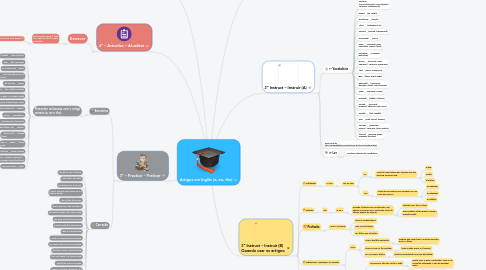
1. http://inglesdefato.com/
2. 5º Passo – Revisar
2.1. Este Mapa Mental
2.1.1. Periodicamente - Utilizar as técnicas da Ferramenta MAPA MENTAL. Para saber mais clique aqui no link abaixo: http://inglesdefato.com/MapaMentalR
3. 4º – Actualize – Atualizar
3.1. Escrever
3.1.1. Escreva pelo menos 1 frase para cada um dos 3 artigos estudados
3.1.1.1. Que tal escrever mais frases? :D
4. 3º – Practice – Praticar
4.1. Exercícios
4.1.1. Preencher as lacunas com o artigo correto (a, an e the):
4.1.1.1. I bought __________ pair of gloves.
4.1.1.2. I saw __________ film last night.
4.1.1.3. He is staying at __________ hotel.
4.1.1.4. Look at __________ man over there! He is a famous doctor.
4.1.1.5. I do not like __________ soccer.
4.1.1.6. That is __________ boy I told you about.
4.1.1.7. __________ night is quiet. Let’s take a walk!
4.1.1.8. __________ price of food keeps rising.
4.1.1.9. Carlos traveled to __________ Mexico.
4.1.1.10. John is __________ Spanishman.
4.1.1.11. I read __________ amazing story last week.
4.1.1.12. My mother doesn’t eat __________ chicken.
4.1.1.13. __________ love is such __________ strange thing.
4.1.1.14. I live in __________ house. __________ house is old.
4.1.1.15. I would like __________ piece of pizza.
4.1.1.16. I was in _______ Chinese restaurant. __________ restaurant served bad food.
4.1.1.17. Jessica can play __________ violin.
4.2. Correção
4.2.1. I bought a pair of gloves.
4.2.2. I saw a film last night.
4.2.3. He is staying at the hotel.
4.2.4. Look at the man over there! He is a famous doctor.
4.2.5. I do not like the soccer.
4.2.6. That is the boy I told you about.
4.2.7. The night is quiet. Let’s take a walk!
4.2.8. The price of food keeps rising.
4.2.9. Carlos traveled to the Mexico.
4.2.10. John is a Spanishman.
4.2.11. I read an amazing story last week.
4.2.12. My mother doesn’t eat the chicken.
4.2.13. The love is such a strange thing.
4.2.14. I live in a house. The house is old.
4.2.15. I would like a piece of pizza.
4.2.16. I was in a Chinese restaurant. The restaurant served bad food.
4.2.17. Jessica can play the violin.
5. LINKS INPORTANTES
6. http://inglesdefato.com/artigos-a-an-the-aprender-ingles/
7. http://inglesdefato.com/MapaMentalR
8. 1º - Witnessing – testemunhando
8.1. 1º Ouvir
8.1.1. Tocar o Vídeo
8.1.1.1. Sem Legenda
8.1.1.1.1. Diversas Vezes
8.2. 2º Escrever
8.2.1. Palavras Entendida
8.2.1.1. Não se preocupar com:
8.2.1.1.1. Escrever Corretamente
8.2.1.1.2. Entender 100%
8.3. 3º Ler a Legenda
8.3.1. Corrigir o que escreveu
8.3.1.1. Reescrever o diálogo
8.4. 4º Pronunciar
8.4.1. Praticar a Pronúncia (Ler em voz alta)
8.5. 5º Absorver
8.5.1. Ouvir o Diálogo
8.5.1.1. Última Vez
8.5.1.1.1. Sem legenda
9. 2º Instruct – Instruir (A)
9.1. 1º Vocabulário
9.1.1. Amateur: _________ (non-professional, non-specialist / Antonym: professional).
9.1.2. Shows: _________ (be visible)
9.1.3. Horrifying: ________ (terrify)
9.1.4. After: ________ (subsequent to)
9.1.5. Carried: ___ (moved, transported)
9.1.6. Happened: ________ (occur)
9.1.7. Main: ________ (principal, most important, central, focal)
9.1.8. Including: ________ (Antonym: Excluding)
9.1.9. Driver: ________ (motorist, pilot, operator / Antonym: Passenger)
9.1.10. Said: _______ (voice, pronounce)
9.1.11. Big: _______ (large, great, huge)
9.1.12. Reported: _______ (announce, describe, detail, communicate)
9.1.13. Seen: ________ (perceive, notice)
9.1.14. Crashed: _______ (collide, collision)
9.1.15. Moved: ________ (proceed, progress, advance, pass, carry)
9.1.16. Quickly: ________ (fast, rapidly)
9.1.17. Way: _______ (road, street, avenue)
9.1.18. Unclear: ________ (uncertain, unsure / Antonym: clear, evident)
9.1.19. Started: _______ (emerge, erupt, originate, develop)
9.2. Texto da aula http://inglesdefato.com/artigos-a-an-the-aprender-ingles/
9.3. 2º Ler
9.3.1. Localizar palavras do Vocabulário
10. 2º Instruct – Instruir (B) Quando usar os artigos:
10.1. Indefinidos
10.1.1. "A/AN"
10.1.1.1. Um ou Uma
10.1.1.1.1. “a”
10.1.1.1.2. “an”
10.2. Definido
10.2.1. The
10.2.1.1. O ou A
10.2.1.1.1. Quando o falante está se referindo a um objeto ou pessoa que é conhecido tanto do falante quanto do ouvinte
10.3. Profissão
10.3.1. “a/an” (Um/uma)
10.3.1.1. She’s an archaeologist.
10.3.1.2. He’s a psychologist.
10.3.1.3. My father was a teacher.
10.4. Substantivos “contáveis” no singular
10.4.1. “a/an
10.4.1.1. I saw a bad film yesterday.
10.4.1.1.1. (Repare que nesta frase o ouvinte não sabe qual é o filme)
10.4.1.2. There’s a man at the window.
10.4.1.2.1. (Não se sabe quem é o homem).
10.4.1.3. Do you want a drink?
10.4.1.3.1. (Não foi especificado que tipo de bebida)
10.4.2. “the” (o/a)
10.4.2.1. I’m going to take the cat for a walk.
10.4.2.1.1. (neste caso, o gato é conhecido, trata-se do animal de estimação, e não de qualquer gato).
10.4.2.2. Have you seen the door key?
10.4.2.2.1. (Quem transmite e quem recebe esta informação sabe de qual chave se fala. Não é qualquer chave).
10.4.2.3. They live in the building opposite ours.
10.4.2.3.1. (Existe apenas um prédio do lado oposto. Não é qualquer prédio).
10.5. Não se usa artigo
10.5.1. Quando se fala de coisas em geral, normalmente se usa um substantivo no plural ou um substantivo que não se conta.
10.5.1.1. Cats eat mice.
10.5.1.1.1. Não se usa nenhum artigo antes de CATS
10.5.1.2. Water flows downhill.
10.5.1.2.1. Não se usa artigo antes de WATER
10.5.1.3. Giraffes live in Africa.
10.5.1.3.1. Não se usa artigo antes de GIRAFFES

